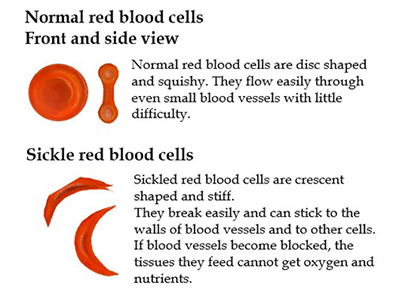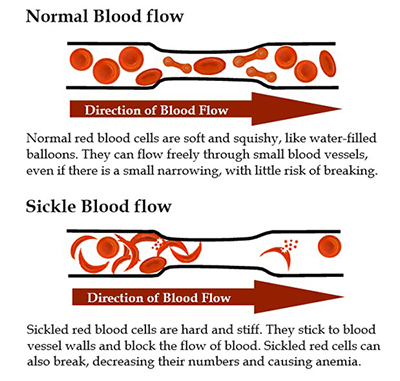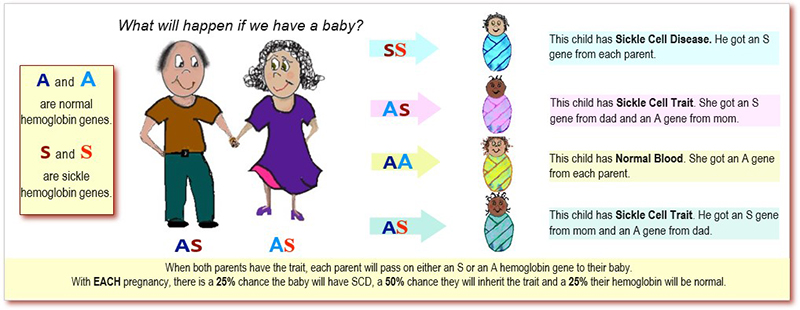What is Sickle Cell Disease (SCD)?
Sickle Cell Disease (also called Sickle Cell Anemia) is a hereditary genetic blood disease caused by an abnormal form of hemoglobin. Hemoglobin is the molecule in red blood cells that helps carry oxygen. To have this condition, you must inherit two abnormal copies of the gene, one from each parent. Due to the complications associated with the disease, most patients will know they have sickle cell disease by the time they reach adolescence. In many provinces, including Ontario, families of younger patients would have been told of the diagnosis as a result of newborn screening. However, individuals with the sickle cell trait, in which an abnormal gene is inherited from just one parent, are almost always asymptomatic, and many individuals may not know they carry the gene until they have a child born with SCD.

Why is it Called Sickle Cell Disease?
When deprived of oxygen, red blood cells of a person with SCD become crescent-shaped (like the letter “C”) and are known as sickle cells due to their resemblance to an old farming tool known by that name. Sickle blood cells tend to stick together, form clumps and block blood vessels. This can result in pain, and can cause serious health problems including damage to internal organs such as the brain, eyes, lungs, liver, spleen, heart, kidney, bones and skin.
Without long-term and comprehensive care, people with SCD can develop significant disability and premature death. Sickle cells are also “brittle” and break apart easily, and for this reason only last in circulation for 10-20 days, compared to 120 days for individuals with normal hemoglobin. The resulting hemolytic anemia can cause fatigue, gallstones and yellow discolouration of the eyes.


How Will I Know my Sickle Cell Status?
To know your sickle cell status, you will need to ask your family doctor for a requisition to the laboratory for hemoglobin electrophoresis testing. This test is covered by all provincial health plans in Canada and will therefore be provided without charge.
The result of the test may show SCD, or sickle cell trait (SCT) or some other hemoglobin variant. Your family doctor will discuss the significance of the result with you and if necessary refer you to a specialist for additional follow-up.
Overexertion and Sickle Cell Trait
Recent studies have shown that individuals with SCT, though they are generally healthy, need to be careful not to overstress themselves as severe dehydration and overexertion can lead to serious health issues, including sudden death.
Authorities such as the American Society of Hematology have advised against mandatory testing for SCT prior to performance in athletic activities, but do recommend global preventative strategies for all athletes, including ensuring adequate hydration and appropriate rest breaks.
Can I Catch Sickle Cell Disease or Sickle Cell Trait?
No, unlike flu or HIV, you do not catch SCD or SCT. All sickle cell conditions are inherited, just like blood types, hair and eye color.
What if I Have Sickle Cell Trait (SCT)?
Sickle Cell Trait is asymptomatic (meaning it does not cause symptoms) and as such many will not know that they carry the trait unless they get tested for it. It is important to know if you have sickle cell trait, because it means you and your partner may require genetic counselling prior to having a child together.
There are some rare conditions associated with SCT (e.g. blood in the urine) so knowing your status may be helpful. If you and your partner both carry an abnormal copy of the gene, there is a 25% (1 in 4) chance that with each pregnancy, your baby will have SCD, a 25% chance they will have no abnormality, and a 50% chance they will inherit the condition as trait as well.
Talk to Your Partner
If you learn that you have SCT or SCD, discuss it with your partner. If you are planning to have children, it is important that you both be tested, and that as a couple you seek genetic counselling if you are both carrying affected genes. Ignorance is no longer acceptable. Having a child with SCD should be an informed decision. Getting tested before having children gives you peace of mind and it is the smart thing to do.





